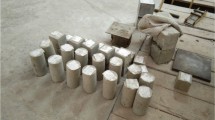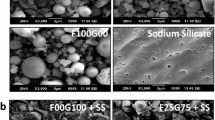Abstract
The energy consumption and the greenhouse gases emission in order to manufacture Portland cement (PC) is very high. To find an alternative, the researchers initially replace the PC partially by Fly Ash. Later on, the researchers introduce a new binder which is being manufactured by the activation of ground granulated blast furnace slag (GGBFS). The paper presents the detail of the binder, manufactured by GGBFS and mild alkali as activator having the pH value of 10. The binder is manufactured by simple blending in which 85% is GGBFS, and 15% is the chemical activator. The test results of the alkali activated binder concrete (AABC) for compressive strength, splitting-tensile strength and flexural strength were found after exposure to elevated temperature 100 °C, 200 °C, 300 °C, 400 °C, 500 °C, 600 °C, 700 °C and 800 °C. It has been observed that these results of the AABC at elevated temperature were very much comparable with that of the ordinary Portland cement concrete (OPCC). The deterioration in strength starts from 200 °C onwards. No spalling of the alkali activated binder concrete (AABC) has been observed at elevated temperature even at 800 °C.
Access this chapter
Tax calculation will be finalised at checkout
Purchases are for personal use only
Preview
Unable to display preview. Download preview PDF.
Similar content being viewed by others
References
Schneider, M., Romer, M., Tschudin, M., Bolio. H.: Sustainable Cement Production – Present and Future. Cement and Concrete Research 41 (2011) 642-650.
https://www.climatetechwiki.org/technology/energy-saving-cement.
Kumar, V., Kumar. A., Prasad, B.: Mechanical Behaviour of Non Silicate based alkali activated ground granulated blast furnace slag, Construction and building Material 198(2019) 494-500.
Glukovsky V.D. Soil silicates. Gosstroiizdat, Kevin, 1959.
IS:12089-1987, Specification of granulated slag for the manufacture of Portland slag cement.
IS: 383-2016, Coarse and fine aggregate for concrete – specification.
Author information
Authors and Affiliations
Corresponding author
Editor information
Editors and Affiliations
Rights and permissions
Copyright information
© 2020 Springer Nature Singapore Pte Ltd.
About this paper
Cite this paper
Kumar, V., Kumar, A., Prasad, B.K. (2020). Influence of High Temperature on Non-Silicate Based Activated Blast Furnace Slag. In: Ha-Minh, C., Dao, D., Benboudjema, F., Derrible, S., Huynh, D., Tang, A. (eds) CIGOS 2019, Innovation for Sustainable Infrastructure. Lecture Notes in Civil Engineering, vol 54. Springer, Singapore. https://doi.org/10.1007/978-981-15-0802-8_99
Download citation
DOI: https://doi.org/10.1007/978-981-15-0802-8_99
Published:
Publisher Name: Springer, Singapore
Print ISBN: 978-981-15-0801-1
Online ISBN: 978-981-15-0802-8
eBook Packages: EngineeringEngineering (R0)




